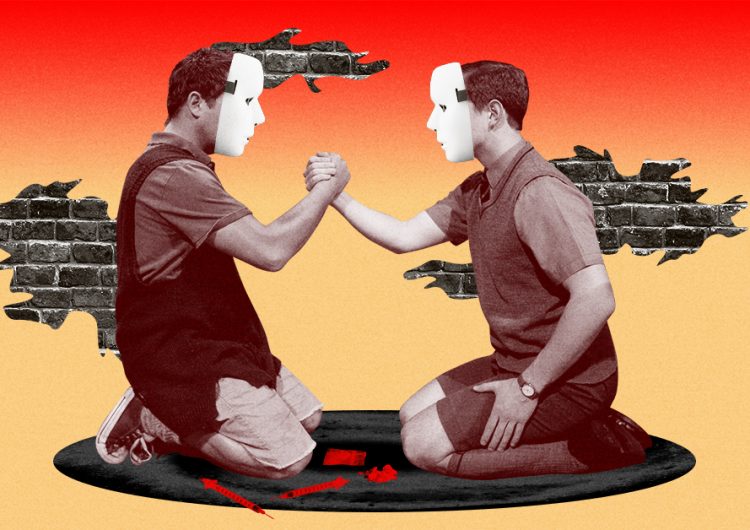In the recesses of urban Manila, an intersection of two of the country’s worst national issues converge to wreak havoc on its victims’ lives. The country continues to turn a blind eye. This is the reality that documentary Kemikal Romance paints.
Also known as Party and Play, ChemSex is part of the gay community’s darker side of the underground.
The six-minute documentary shares the stories of three HIV-positive victims, all of whom were caught in the crossfire of the Drug War. These individuals partake in “ChemSex,” an underground culture that intersperses drug use, often local metamphetamines known as shabu, and sexual activity. Also known as Party and Play, ChemSex is part of the gay community’s darker side.
At the height of the Drug War along with the rising HIV epidemic and its stigma in the Philippines, these individuals are in worse risk than ever before. One interviewee, anonymously named Rue, was framed and arrested as a drug pusher while he was trying to avail of HIV medication. It was his worst fear come to life.
Rue’s story, along with the many, many untold ones, just goes to show how the country’s severe political climate instills a fear of reaching out for help, and it is a fear that is disastrous—and possibly fatal—for the helpless. At this point we begin to ask, are drug users and HIV carriers forever condemned?
At this point we begin to ask, are drug users and HIV carriers forever condemned?
The creators of the documentary are Filipino-American filmmaker Eli Hiller and HIV advocate Faustine Luell “Paji” Angeles Jr. With such a controversial story to tell, the production of the film was without ease. “There were many stressful moments and sleepless nights,” Eli tells us in an e-mail interview.
During the process, their actors were arrested and detained in jail for 24 hours. The crew was unable to secure a proper permit at the time while they were shooting a simulated buy bust scene. The actors were wearing rented police uniforms, wielding plastic toy guns. “I assumed that it would only result in a warning or at most a minor citation, but we were taken to the police headquarters,” recalls Eli. Then, the police proceeded to detain the actors who were “stripped of their belongings and thrown into an overcrowded jail cell” for playing a role. “My morale was rock bottom for several days after that incident,” says the director.
Then, the police proceeded to detain the actors who were “stripped of their belongings and thrown into an overcrowded jail cell” for playing a role. “My morale was rock bottom for several days after that incident,” says the director.
It’s a frightening thought that play-pretend could already merit jail time. What more would this mean for those who live the story in real life, some who are only victims of their circumstances? Some who are only seeking a chance for redemption, but are forced into the shadows in fear?
Paji, who pitched the idea to Eli after chancing upon an open call for films by the Asia Network of People who Use Drugs (ANPUD), is diagnosed as HIV-positive himself. He knows, more than anyone, how important it is for the stories of the affected to be heard, even if society tries to ignore it. “It was never easy to live with this virus, but I told myself that, more than anyone else, we should be the one to be more proactive in spreading proper information and fighting against stigma,” he tells us.
We talked to the directors separately via e-mail to unpack their experience in creating the film and their headspace during its creation. Read their thoughts below.
You yourself are an advocate for HIV awareness, and I noticed that on your Instagram bio, you are also open about your HIV+ diagnosis. Could you share with us other advocacy initiatives you have prior to Kemikal Romance?
PAJI: Yes, I’ve been living with HIV for eight years now. It was never easy to live with this virus, but I told myself that, more than anyone else, we should be the one to be more proactive in spreading proper information and fighting against stigma. It was 2015 when I founded Pedal for HIV, which aims to promote HIV awareness through sport-related activities. Since then I’ve been invited to numerous speaking engagement in different schools, communities and media networks in the Philippines and other countries. I have been working with different government agencies, NGOs, and international organizations in polishing our laws and creating policies that aim to end the HIV epidemic in the country. I have been very active as well in fighting for the rights of my fellow people living with HIV.
It must feel quite intimate on your part to take on such a project. Did you have any worries or fears about making the film, or was it really an “all in” jump for you?
PAJI: This idea did not happen overnight, especially knowing the risks involved with any drug war-related information. I consulted my mentors regarding my idea of being aggressive to push our government to have a more holistic approach on HIV prevention and drug wars, by having a harm reduction program which have been successful in many countries. Prior to doing this film I had a lot of what ifs, which almost gave me the reason not to pursue the project because I’m scared that we might get in trouble by speaking up. Until some things happened, which gave me the courage to speak up and stand up for the rights of people who use drugs especially those living with HIV too.
I personally had never heard about ChemSex prior to Kemikal Romance, and considering its implications, I find it alarming that it’s not talked about more. Has this subculture existed in Manila for a long time, just in the shadows?
PAJI: Many people are not aware of the term ChemSex, or if it’s really true that there are people who take drugs just to have sex. Yes, it’s been happening in the country for more than a decade or so. Many people contracted HIV through their risky behaviours while doing ChemSex. Our government focused more on the injecting drug users in Cebu, and even DOH doesn’t have any data regarding drug use in Manila. As you know, there was a 2017 drug buy bust incident that became a headline in different news networks. [It] involved a drug-fueled sex orgy, [also] called ChemSex. There [are] many people who [do] ChemSex who are responsible enough to take care of themselves. They are functional in a way that their activities don’t affect their daily lives, and are not a threat to the society. The big problem here is those who got hooked [on] drug use, who became irresponsible of taking care of themselves, which make them do things that possess threats to themselves and others. But how can these people stay away from using drugs even if they want to, when we don’t have a program that protects the rights of people who use drugs and provide them the medical intervention they need to overcome this health condition?
But how can these people stay away from using drugs even if they want to, when we don’t have a program that protects the rights of people who use drugs and provide them the medical intervention they need to overcome this health condition?
What would you want to say to HIV+ youth who hold themselves back to seek help, or find help to be inaccessible?
PAJI: To all people living with HIV who are afraid to seek help due to whatever reasons they have, keep in mind that not a single person can help you if you will not help yourself. Do not be afraid to consult a doctor to get treated because no one should be dying because of HIV anymore. To those who are having [difficulty to] find help [and] access [to] treatment, feel free to send a message to Pedal for HIV on Facebook, and rest assured, we will do everything we can to help you. Antiretroviral therapy was able to save millions of lives, which you only have to take daily.
Most people diagnosed with HIV says that this virus is the end of their dreams, when in fact it will not change a thing. HIV will not stop you from achieving your goals because stopping is a choice.
Just think about HIV as a reminder that you have to love and care for yourself better more than anything else in the world. Most people diagnosed with HIV say that this virus is the end of their dreams, when in fact it will not change a thing. HIV will not stop you from achieving your goals because stopping is a choice. I know that living with this virus is not and will never be easy given the fact that there is stigma associated with it. If you embrace what you have and look at the brighter side, then you will see that this virus is a gift of new life. Then I assure you that on the day you overcome all your fears, you will have the courage to face the world with all the strength you need which can’t bring you down. Remember that we all have a choice—look back and regret, or look back, move on, and live life with purpose.
Do not be afraid to consult a doctor to get treated because no one should be dying because of HIV anymore.
What do you think needs to happen in our society to chip away at the stigma on HIV?
PAJI: Stigma is everywhere around the society and even to ourselves. How can we help end something in our society if we can’t end it within ourselves? First we must be educated enough about HIV, especially on how it is being treated, prevented, and providing care & respect to people living with it. HIV is not just an issue of people who live with it or those who engage in risky activities. Every single person in the world has the responsibility to help end this global issue. Many people are not aware that they are affected by this epidemic because they’re not living with the virus. HIV does not discriminate, and everyone of us are affected by this virus in many ways regardless of what our status is. Our society has to be more open-minded to think about ourselves, our community, our loved ones, and a better future for everyone. If we hold back our assumptions and religious beliefs to think about what’s happening in the medical field [instead], then we can eventually go further in preventing new HIV infections in the country. Let’s not wait for us or anyone we know to contract this virus before we realize that we can do something and we must do something to help.
***
As co-directors, how was the work dynamic between you and Paji? Was there a task delegation of sorts, or was every step collaborative?
ELI: At the core of our team, it was Paji as a line producer, myself and my producer-girlfriend Jerilee Salvador. It was both collaboration and delegation of tasks I suppose. Paji came to me with the idea for the film, helped me understand the chemsex phenomenon and secured film participants willing to share their stories. Many of the major decisions for the film were decided on together.
My producer-girlfriend Jerilee was also essential because she managed our limited budget and production schedule, found reenactment actors, and most importantly kept me positive through all of my mental breakdowns. Find one that can keep you sane.
I took on the role as a storyteller and wrote the script, shot, directed and edited the short film. Although I had additional support and creative input from Digital Dreams Inc., Resbak, Barrio 99, our visual film collective, and Pedal for HIV.
What made you decide to do a documentary on this topic?
ELI: Paji came to me with the idea about a chemsex documentary and to be fully honest I had no clue what the term meant. Although after further research, I realized that there were so few creative works on the topic internationally and even fewer in the Philippine media. The most notable was the BGC raid on a chemsex party that arrested 11 men and illegally announced one of their HIV status on national TV.
Local media tend to portray these people only as criminals and never seek to understand the reason behind this phenomenon. I knew at that moment there was space to create a documentary short that told a more holistic story about chemsex and those involved.
Local media tend to portray these people only as criminals and never seek to understand the reason behind this phenomenon.
In the film, it was mentioned that your actors were arrested. Could you share how and why this happened, and other difficulties you faced in the creation of Kemikal Romance?
ELI: While filming a scene reenacting a buy bust scenario, we were stopped by barangay officials because we were using rented police uniforms and plastic guns without a film permit. It was a terrible mistake that Paji and I overlooked by not securing the location properly. Paji had family and connections in the barangay where we were filming and we expected it wouldn’t raise an issue.
I assumed that it would only result in a warning or at most a minor citation, but we were taken to the police headquarters. Later that evening, my two actors who were reenacting officers were jailed for 24 hours.
It was hands down the lowest point of my professional career watching my two actors be stripped of their belongings and thrown into an overcrowded jail cell at the expense of my error. My morale was rock bottom for several days after that incident.
We ended up sacrificing that footage and reshooting the scene with different talents as not to further incriminate them. There were many stressful moments and sleepless nights, but we did manage to pull it together.
Desperate solutions such as mass incarceration and slaughter only create a culture of fear and impunity in the country. Fear cannot cultivate progress, only trust can accomplish that.
What do you envision for the film to achieve?
ELI: I’d like a Philippine audience be empathic to these characters’ struggles and all people living with HIV. I hope others realize how the HIV epidemic and drug epidemic are both interrelated health issues. Desperate solutions such as mass incarceration and slaughter only create a culture of fear and impunity in the country. Fear cannot cultivate progress, only trust can accomplish that.
I hope people realize that rehabilitation and reintegration in society should be principal in the nation’s approach to these epidemics.
I believe it boils down to addressing homophobia, a long-time resistance to sexual education, the shame around contraceptives and campaigns specifically designed for the LGBTQ+ community.
What do you think needs to happen in our society to chip away at the stigma on HIV?
ELI: In recent years, the Philippines has made notable progress towards HIV testing and providing antiretroviral treatment, but efforts for prevention and fighting stigma seem lackluster. This isn’t a quick fix. We can’t throw a band aid on this epidemic and pretend it will stop bleeding.
I believe it boils down to addressing homophobia, a long-time resistance to sexual education, the shame around contraceptives and campaigns specifically designed for the LGBTQ+ community.
Many schools approach sexual education with a heavy emphasis on abstinence, and little concentration on contraceptives or HIV prevention. I even have close friends that joke about never using condoms because they rather avoid shame and risk their health. It sounds ridiculous, but honestly it’s the sad truth.
Many schools approach sexual education with a heavy emphasis on abstinence, and little concentration on contraceptives or HIV prevention. I even have close friends that joke about never using condoms because they rather avoid shame and risk their health. It sounds ridiculous, but honestly it’s the sad truth.
I hope the new HIV-AIDS bill will address these issues and prioritize the health of the Filipino people.
Art by Renz Mart Reyes

























Comments